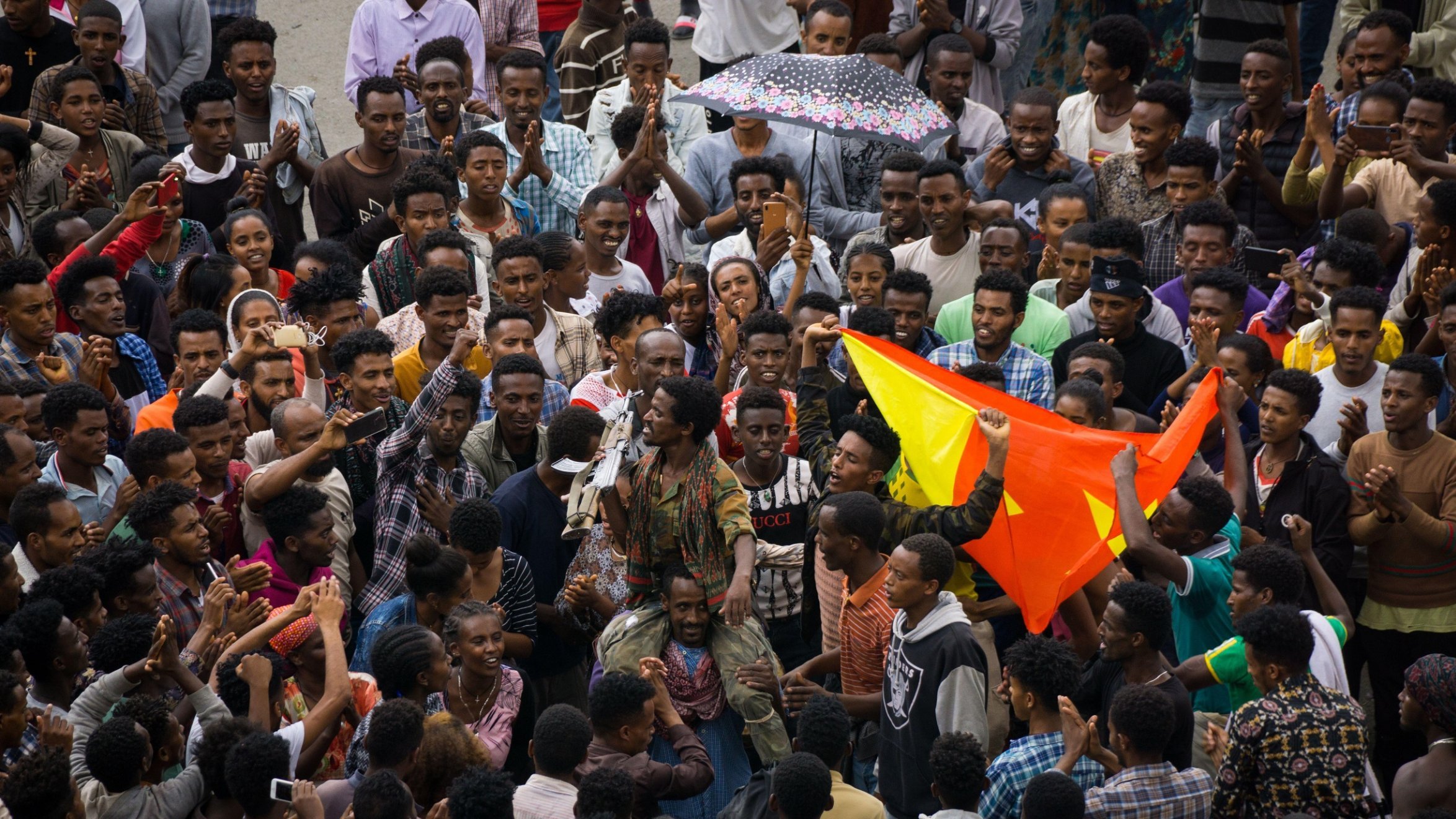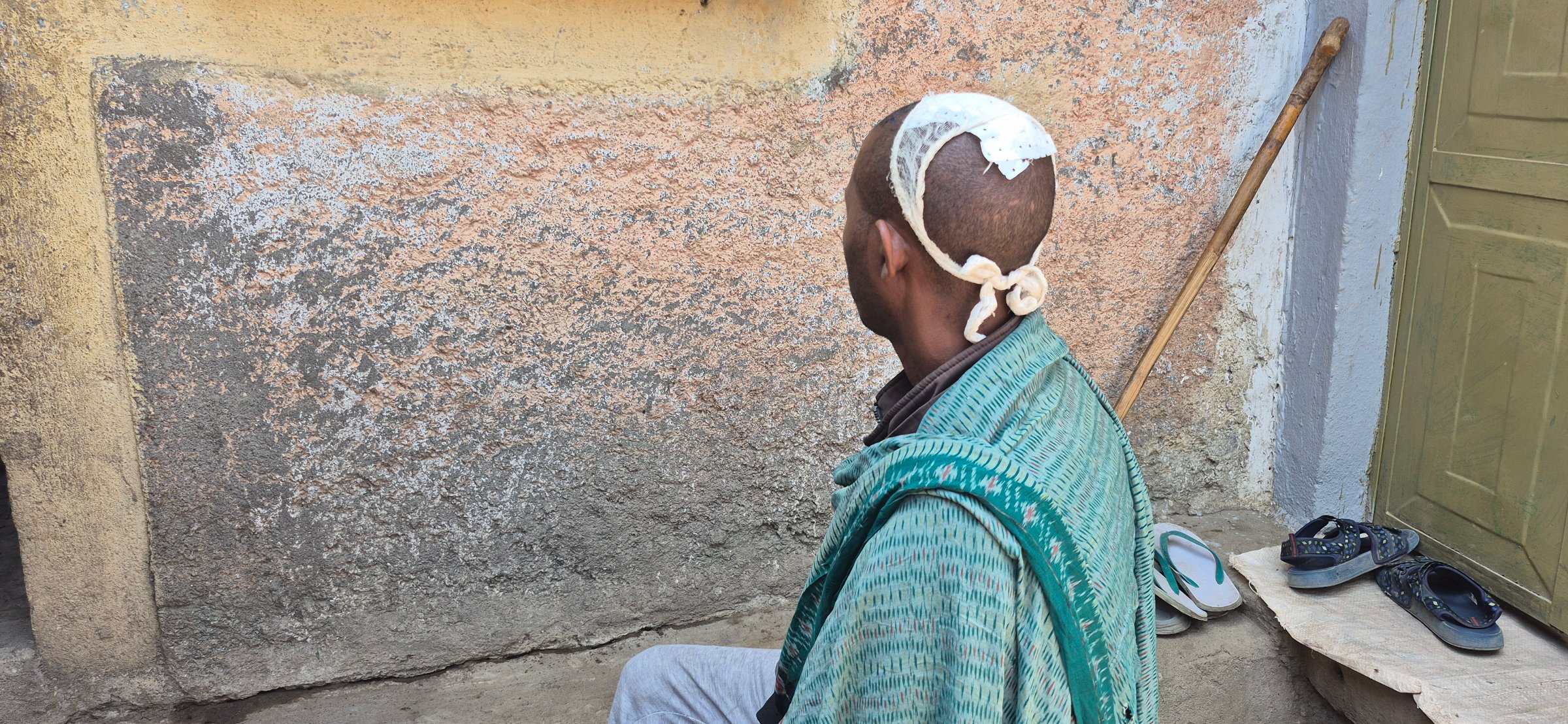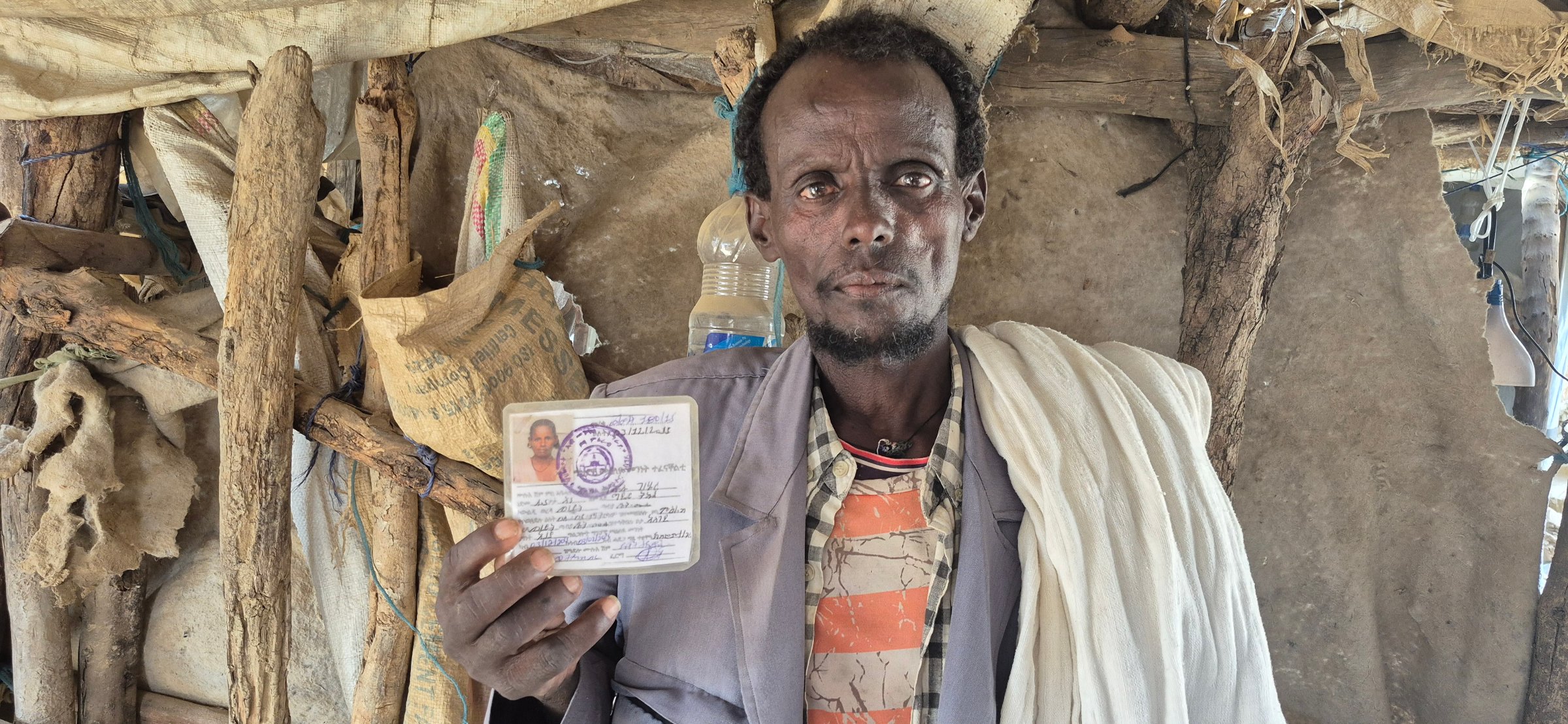
Spread along narrow, winding, dusty paths, a maze of tents bearing the blue UN logo has served as a refuge for some 28,000 people for over four years. The Adi Mehameday camp is 82 kilometres from the town of Shire, in the Tigray region of northern Ethiopia. It shelters a fraction of the one million displaced people who have been unable to return home, despite the end of the war between the Tigray People’s Liberation Front (TPLF) and the Ethiopian National Defence Forces on November 2, 2022.
“We had hoped, but we still have not received any concrete information from our leaders. They sometimes announced our return, but it never happened,” says Medhin Yalem, her face drawn with fatigue. The lack of food is taking a toll on her father, who has been too weak to walk for a year, while her 20-year-old son suffers from anaemia. The family rarely eats more than one meal a day. Like most of the survivors in the Adi Mehameday camp, Medhin Yalem is originally from Wolkait, an administrative zone in western Tigray. “Some of our neighbours tried to go back to Tselemti [a district near Wolkait, editor’s note], but they came back. The area is not safe,” continues the woman in her fifties, now left without income after abandoning her livestock and plot of land.
Despite the peace agreement, the Tigray region – currently governed by an interim administration linked to the TPLF but formally under the authority of Addis Ababa as stipulated by the Pretoria accords – remains under pressure from several armed factions. Wolkait is still occupied by Amhara forces, from a neighbouring region that fought alongside the federal government and claims this stretch of territory. Meanwhile, in north-eastern Tigray, Eritrean troops – also allies of Addis Ababa during the war – continue to occupy parts of the region along their border.
Since then, the victims of one of Africa’s deadliest wars – which killed around 400,000 soldiers and 300,000 civilians, according to a report published in June 2024 by the New Lines Institute – have been surviving in a state of ‘neither war nor peace’.
Internal power struggles and repression
In March, internal tensions within the TPLF nearly added further confusion to the already complex situation. Debretsion Gebremichael, leader of the TPLF, and Getachew Reda, then president of Tigray’s interim administration, accused each other of slowing down the implementation of the peace agreement. The accord outlined the return of displaced persons, the withdrawal from occupied areas, and the disarmament and reintegration of 274,000 fighters who had joined the Tigray Defense Forces (TDF), the armed wing of the TPLF. Only 17,000 of them have taken part in the demobilisation program, according to a statement by the National Rehabilitation Commission at the end of April.
The growing disagreements between Debretsion Gebremichael and Getachew Reda led to the latter’s expulsion from the TPLF on September 15, 2024. Six months later, on March 10, Getachew Reda, still serving as president of the interim administration, suspended three TDF generals. In response, Debretsion Gebremichael appointed his own allies to lead cities where Getachew had placed close supporters – including the regional capital, Mekele. ’Getachew was talking about reforming local administrative councils when his priority should have been to liberate his people. Many Tigrayans saw that as premature, while they’re still living in makeshift shelters with no food, water, or clothing, explained Debretsion Gebremichael, interviewed on March 18 at the Axum Hotel in Mekele.
Sporadic violence, arbitrary arrests, and at least one extrajudicial execution followed, according to testimonies collected by Afrique XXI in Mekele and the small town of Adi Gudom, located 40 km to the south. Hadera Kiros, president of the Adi Gudom Youth Association, spent three days in detention during the mayoral change, which some described as a “coup d’État.” “Young people are fleeing to Mekele or Addis Ababa because they’re afraid of the TPLF and its soldiers,” said the father of two.

On March 11, Alemu Haile, a 37-year-old construction worker, stood among a hundred residents of Adi Gudom protesting the replacement of the pro-Getachew mayor with one appointed by Debretsion. With a bandage on his head and a weakened voice, the father of two says he was shot in the head three times by militiamen linked to the TDF. “Force cannot be the solution,” laments his older brother, Gebrehiwet Haile. “It is essential that leaders engage in dialogue with citizens. Otherwise, they risk triggering a new conflict between Getachew’s supporters and those of Debretsion,” warns the civil servant.

Getachew Reda was eventually removed from his position as head of the interim administration in favour of General Tadesse Werede on April 8, with the approval of Addis Ababa. Still, this change has not reassured the people of Tigray. “I have not seen any change or concrete solutions to the problems affecting us. The instability continues. We feel unsafe and live-in fear,” says Mistral Abraha from Shire. The political and security chaos has forced this unemployed pharmacist to delay the opening of her own pharmacy for months. “I need guarantees and stability,” insists the woman who contributed to the war effort by treating the wounded in a public clinic where salaries were never paid.
Abiy Ahmed and the Spectre of a Conflict with Eritrea
The appointment of Tadesse Werede also raises concerns for Meressa Dessu, a researcher at the Institute for Security Studies based in Addis Ababa. “Tadesse has consistently downplayed the failure of the interim administration. By appointing him, [Prime Minister] Abiy Ahmed is trying to deepen divisions within the TPLF and the TDF,” warns Meressa Dessu.
In Addis Ababa, the internal quarrels within the TPLF are rarely commented on. Prime Minister Abiy Ahmed is preoccupied with other conflicts within the country, particularly in the Amhara and Oromia regions. In April 2023, in Amhara, the Fano militias staged violent protests against the integration of regional forces into the national army and police. These tensions escalated four months later into an armed rebellion against federal troops – the same troops the Fano and regional forces had fought alongside during the Tigray conflict.
The Prime Minister is also invoking the spectre of renewed hostilities with Eritrea through belligerent rhetoric. “Military mobilisation continues in Eritrea. For his part, Abiy Ahmed has not given up on securing access to the Red Sea. The incompatible interests of these two nations – once united until Eritrea’s independence in 1993 – and their refusal to negotiate will inevitably lead to war,” warns Meressa Dessu. The researcher adds that divisions within the Tigrayan population benefit both Abiy Ahmed and Eritrean dictator Isaias Afwerki.
“I Don’t Want to Waste Time on War”
These tensions are a source of concern for the people of Tigray. “We fear that the situation could flare up between Ethiopia and Eritrea,” said Debretsion Gebremichael in mid-March. “We hope the disputes will be resolved diplomatically. Because even if we are not involved, the fighting will inevitably take place here, on our land, due to our geographic location.” In February, the specialised outlet Africa Intelligence revealed “an unprecedented confidential meeting in late January in Asmara”, during which Isaias Afwerki allegedly “promised TDF officers his protection in the event of conflict with Ethiopia”. When asked, the TPLF leader denied having any contact with Eritrean authorities.
Relations between Debretsion Gebremichael’s faction and Addis Ababa remain extremely strained. “Instead of focusing on the rehabilitation of the Tigrayan population, which has endured a genocidal war, the Ethiopian government has engaged in harmful actions such as blocking the entry of essential goods into the Tigray region – including fuel – and halting life-saving activities. These actions endanger the lives and livelihoods of the Tigrayan people,” denounced the TPLF in a statement dated March 26.
And most former TDF fighters are unequivocal: they will not take up arms again. “War helps no one. You lose so many lives and end up with an agreement that changes nothing,” says Kaleb, speaking under a pseudonym. In 2021, the 25-year-old painter enlisted after a relative was killed. Frustrated by the power struggles among Tigrayan leaders, he is relieved to have secured a visa for the United States. “I’m young, I can achieve a lot. My family is counting on me. I don’t want to waste any more time on war.”
Malnutrition Is Already Claiming Lives
In a narrow alley in Mekele, away from prying ears, Abebe (a pseudonym) confides that he too would rather leave Ethiopia than put on the uniform again. “We now know the consequences of war,” the thirty-year-old emphasises. “I lost my two little brothers and friends. Political leaders must bring peace and stop working for their own interests.” Part of the majority of former TDF members who have not been demobilised, this doctor, who works at a military hospital in Mekele, fears being forced to fight again if new clashes erupt. His hometown remains occupied by Eritrean troops, preventing his parents from leaving the displaced persons camp that shelters them. “The Tigrayans have sacrificed and overcome so many challenges that no one wants to return to war,” he concludes.
Back in Adi Mehameday, unemployed farmer Medhin Yalem, mentioned earlier, describes how the community hosting the displaced have gradually turned its back on them. “The locals are fed up with us. They no longer have enough food to share because they themselves are suffering the effects of the conflict,” laments the mother of the family. Meanwhile, malnutrition is worsening in Tigray. In early March, hunger claimed the life of Abeba Teklu, mother of three young girls. “She had been suffering from malnutrition for two to three years. Her condition worsened, and she developed kidney failure,” recounts her widower, Tesheger Tagegne.

The Mekele Public Health Research Institute recorded an increase in malnutrition among children and adolescents under 18 years old, rising from 43% to 48% between July 2024 and January 2025. “Tensions at various levels and the fear of a new war are contributing to malnutrition and food insecurity,” says Hayelom Kansai, the institute’s director. The freezing of funding by the United States Agency for International Development (USAID), ordered by U.S. President Donald Trump on January 20, has further worsened a humanitarian situation that could become catastrophic if the war resumes.
If you believe in the importance of open and independent journalism:

